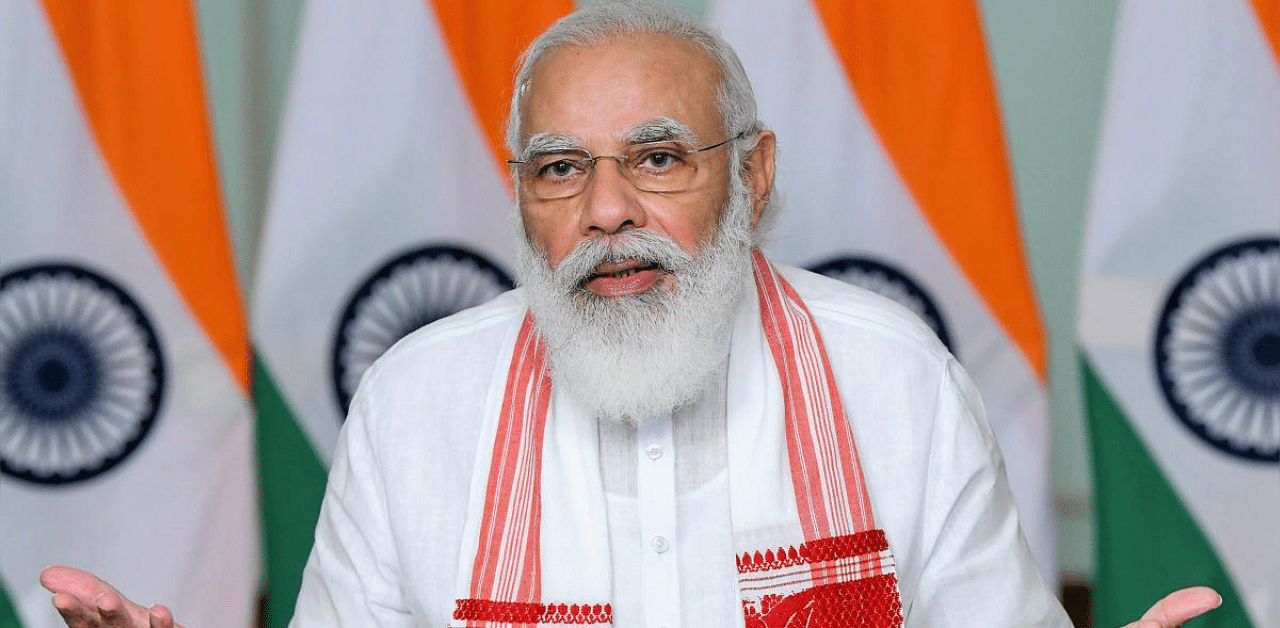
Soon after Joe Biden was declared winner of the United States presidential elections, Prime Minister Narendra Modi congratulated him and his Indian-American running mate Kamala Harris on Twitter – indicating New Delhi’s keenness to work with the new regime in the White House to deepen India-America strategic partnership.
“Congratulations @JoeBiden on your spectacular victory! As the VP (Vice President), your contribution to strengthening Indo-US relations was critical and invaluable. I look forward to working closely together once again to take India-US relations to greater heights,” Modi posted on Twitter just a few minutes past midnight.
The Prime Minister did not wait for outgoing President Donald Trump to concede defeat, notwithstanding the ‘bromance’ the two leaders displayed in public.
Modi also posted a picture of him with Biden. The picture was shot during a September 2014 luncheon that Biden, then the Vice President in President Barack Obama’s administration, hosted in honour of Modi, who was then on his first visit to Washington D.C. after being elected as the Prime Minister of India.
The Prime Minister also tweeted to congratulate Senator Kamala Harris – the first woman and the first Indian-American set to take over as the Vice President of the US.
“Heartiest congratulations @KamalaHarris! Your success is path-breaking, and a matter of immense pride not just for your chittis, but also for all Indian-Americans. I am confident that the vibrant India-US ties will get even stronger with your support and leadership,” Modi posted on Twitter.
Harris, who has been representing California in the US Senate since 2017, referred to her ‘chittis’ (aunts in Tamil) when she accepted the Democratic Party’s nomination for Vice President on August 19 last.
Her mother, Shyamala Gopalan, who was born in Chennai, had migrated to the US in pursuit of a career in medical research. Her father Donald Harris was also an immigrant from Jamaica.
Modi’s tweets congratulating Biden and Harris signalled New Delhi’s keenness to move fast and engage with the new regime in Washington D.C. - notwithstanding the bonhomie the Prime Minister shared with the outgoing President Donald Trump, who so far showed no sign of accepting the outcome of the elections and concede defeat.
The Modi-Trump bonhomie was put on public display twice, first at the “Howdy! Modi” event in Houston on September 22 and then again at its sequel, the “Namaste Trump” conclave in Ahmedabad on February 24 this year. The Prime Minister’s “Aab Ki Bar Trump Sarkar” comment at the “Howdy! Modi” event was interpreted by some as his call to Indian-American community to support the US President’s re-election campaign. New Delhi had to clarify later that the Prime Minister had in fact referred to the US President’s 2016 campaign seeking support of the Indian-American community.
Trump kept on talking about his friendship with Modi and even claimed support of the Indian-American community ahead of the elections. He, however, also made at least two critical comments during his pre-election debates with Biden. He alleged during his first debate with the former US Vice President on September 30 that that the Government of India was not making public the actual number of people died of the Covid-19 in the country. He said during the second debate on October 23 that the air was filthy in India, just as it was in Russia and China. The US President apparently made the remark to once again accuse developing nations like India and China of contributing more than the US and other developed countries to global worming and climate change – an allegation dismissed by New Delhi and Beijing in the past as unscientific and politically motivated.
Some of the Democratic Party’s members in the US Senate and the House of Representatives made critical remarks about the Modi Government, particularly over detention of political leaders and activists, shutdowns and restrictions imposed in Jammu and Kashmir (J&K) last year after the move to strip the erstwhile state of its special status and to reorganize it into two Union Territories. Some Democrats in the US Congress also criticized the Bharatiya Janata Party’s government for the new Citizenship Amendment Act and process of updating the National Register of Citizens in Assam.
“We have to remind the Kashmiris that they are not alone in the world,” Harris herself said in October 2019, when she was still in the race for the Democratic Party’s nomination to contest the US presidential elections. She also criticized External Affairs Minister S Jaishankar in December 2019, when he cancelled a meeting with a group of US lawmakers, because it included Pramila Jayapal, who introduced a bipartisan resolution in the American House of Representatives asking New Delhi to end restrictions on communication and arbitrary detentions in the J&K.
Biden too not only asked New Delhi ahead of the elections to take all necessary measures to restore rights of all people in Kashmir, but also expressed disappointment over the CAA and the NRC. He, however, of late also acknowledged the importance of the US-India strategic partnership to counter the growing belligerence of China. The Modi Government also took note of his promise to withdraw the suspension of the H-1B visas – a recent move by President Donald Trump’s administration that hit hard the interests of the Indian Information Technology professionals.
New Delhi underlined ahead of the US presidential elections that its relations with Washington D.C. has been enjoying bipartisan support. “In respect of the United States, successive Governments on both sides have steadily pursued what has become a non-partisan endeavour. A strong economic and technological complementarity, also reflected in their work culture, has laid a strong foundation,” External Affairs Minister S Jaishankar said in Sardar Patel Memorial Lecture – just three days before the “Election Day” in America. Foreign Secretary Harsh Shringla too recently said that India’s relations with the US would continue to be “strong and robust” irrespective of the political dispensation in power in New Delhi or Washington D.C.
